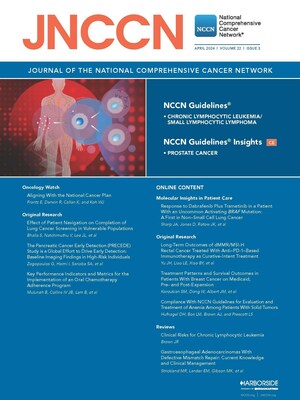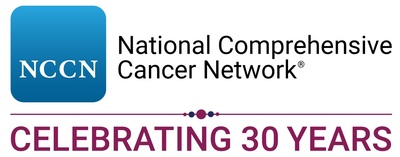Subjects: NPT, SVY, TRI
New Findings in JNCCN Illustrate Pathway for Screening High-Risk Individuals for Pancreatic Cancer in PRECEDE Study
International consortium reports high rates of baseline imaging completion in patients considered at risk for pancreatic cancer. Such a surveillance program may lead to improved outcomes in a disease that has historically been associated with a notoriously low survival rate, largely due to late-stage diagnosis.
PLYMOUTH MEETING, Pa., April 16, 2024 /PRNewswire/ -- New research in the April 2024 issue of JNCCN?Journal of the National Comprehensive Cancer Network showcases the feasibility of improving early detection and prevention for pancreatic cancer. Global incidences of pancreatic cancer have risen dramatically in recent years, but the overall survival rate is currently only 12%. When pancreatic neoplasms are detected early enough for treatment with surgical resection, the survival rate climbs to better than 80%, but unfortunately the vast majority of patients are diagnosed with advanced-stage disease. The Pancreatic Cancer Early Detection (PRECEDE) Consortium is a global effort to increase screening capacity for this disease. Of 1,759 participants sorted into the highest-risk cohort, nearly 80% completed baseline imaging through PRECEDE.
"Individuals who are concerned they are at risk for pancreatic cancer can participate in PRECEDE and obtain an assessment from a PRECEDE site," explained co-lead author George Zogopoulos, MD, PhD of the Research Institute of the McGill University Health Centre and the Rosalind and Morris Goodman Cancer Institute at McGill University in Canada. "If the individual is assessed to be at increased risk for pancreatic cancer, they will have the opportunity to undergo clinical surveillance for pancreatic cancer according to the clinical surveillance services available in their area. Based on our findings, we recommend sorting individuals at high risk for pancreatic cancer into three groups based on family history of pancreatic cancer, the existence of a potentially cancer-causing genetic mutation, or both."
The researchers found a higher incidence of pancreatic cysts in people sorted into the high-risk sub-group based only on family history compared to those with a known genetic predisposition for pancreatic cancer but no family history of it.
"The presence of cysts may identify individuals that are at increased risk of developing pancreatic cancer over time because of cyst changes or because the presence of cysts signals that the pancreas has an intrinsic aberration making it more susceptible to cyst progression or other precancerous growths," said senior author Diane M. Simeone, MD, UC San Diego Moores Cancer Center (New York University Langone Health at the time of study). "Longer follow-up time is needed to determine if familial pancreatic cancer signifies a higher risk for developing pancreatic cancer compared to pathogenic germline variant (PGV) status in a pancreatic cancer predisposition gene."
"This research highlights that?although barriers have prevented the wide-spread implementation of pancreatic cancer screening programs for high-risk individuals?a multicenter international consortium and longitudinal study is feasible; early imaging findings from this study show the need for further pancreatic cancer early detection research," commented Cassadie Moravek, Senior Director of Clinical Trial Portfolio and Program Management, Pancreatic Cancer Action Network (PanCAN).
Moravek, who is a patient advocate on the NCCN Clinical Practice Guidelines in Oncology (NCCN Guidelines®) Panel for Pancreatic Adenocarcinoma, continued: "Low overall survival rates in pancreatic cancer are often attributed to the majority of patients having advanced-stage disease at diagnosis, underscoring the need for improved screening for pancreatic cancer to detect the disease at earlier stages. While the NCCN Guidelines for Genetic/Familial High-Risk Assessment: Breast, Ovarian, and Pancreatic recommend pancreatic cancer screening in select individuals based on known pathogenic germline variants and family history, this study showed that further research in this area is needed to better tailor surveillance to distinct subclassifications of high-risk individuals. The study also identifies a high prevalence of pancreatic cysts in high-risk individuals that do not fully overlap with risks based on known pathologic genetic alterations. I look forward to further research in this area, building upon the infrastructure support of this international consortium, to improve access to pancreatic cancer screening for high-risk individuals, and in turn, advance early detection of pancreatic cancer and improve clinical outcomes."
The PRECEDE sites are located throughout North America and Europe. Several NCCN Member Institutions are involved, including Abramson Cancer Center at the University of Pennsylvania, Dana-Farber Cancer Institute, Fred & Pamela Buffett Cancer Center, Fred Hutchinson Cancer Center, Huntsman Cancer Institute at the University of Utah, Mass General Cancer Center, Mayo Clinic Comprehensive Cancer Center, UC San Diego Moores Cancer Center, and Yale Cancer Center/Smilow Cancer Hospital.
To read the entire study, visit JNCCN.org. Complimentary access to "The Pancreatic Cancer Early Detection (PRECEDE) Study is a Global Effort to Drive Early Detection: Baseline Imaging Findings in High-Risk Individuals" is available until July 10, 2024.
About JNCCN?Journal of the National Comprehensive Cancer Network
More than 25,000 oncologists and other cancer care professionals across the United States read JNCCN?Journal of the National Comprehensive Cancer Network. This peer-reviewed, indexed medical journal provides the latest information about innovation in translational medicine, and scientific studies related to oncology health services research, including quality care and value, bioethics, comparative and cost effectiveness, public policy, and interventional research on supportive care and survivorship. JNCCN features updates on the NCCN Clinical Practice Guidelines in Oncology (NCCN Guidelines®), review articles elaborating on guidelines recommendations, health services research, and case reports highlighting molecular insights in patient care. JNCCN is published by Harborside/BroadcastMed. Visit JNCCN.org. To inquire if you are eligible for a FREE subscription to JNCCN, visit NCCN.org/jnccn/subscribe. Follow JNCCN on Twitter @JNCCN.
About the National Comprehensive Cancer Network
The National Comprehensive Cancer Network® (NCCN®) is a not-for-profit alliance of leading cancer centers devoted to patient care, research, and education. NCCN is dedicated to improving and facilitating quality, effective, equitable, and accessible cancer care so all patients can live better lives. The NCCN Clinical Practice Guidelines in Oncology (NCCN Guidelines®) provide transparent, evidence-based, expert consensus recommendations for cancer treatment, prevention, and supportive services; they are the recognized standard for clinical direction and policy in cancer management and the most thorough and frequently-updated clinical practice guidelines available in any area of medicine. The NCCN Guidelines for Patients® provide expert cancer treatment information to inform and empower patients and caregivers, through support from the NCCN Foundation®. NCCN also advances continuing education, global initiatives, policy, and research collaboration and publication in oncology. Visit NCCN.org for more information.
Media Contact:
Rachel Darwin
267-622-6624
[email protected]
SOURCE National Comprehensive Cancer Network
These press releases may also interest you
|
News published on and distributed by:





